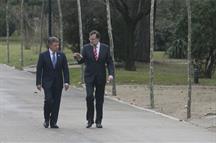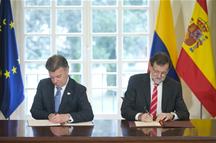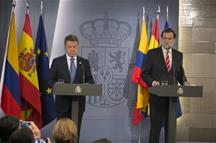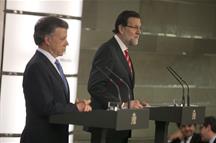Moncloa Palace, Madrid
The President of the Government, Mariano Rajoy, received the President of the Republic of Colombia, Juan Manuel Santos, who is on a State visit to Spain, at Moncloa Palace.
At the joint press conference they gave at the end of the meeting, Mariano Rajoy highlighted that the visit takes places at a key time in the recent history of Colombia. "After half a century of hostilities and numerous victims, President Santos has pushed through a highly complex peace process with a far-reaching historical scope that is currently going through a crucial phase", he explained.
Mariano Rajoy recalled that Juan Manuel Santos was in Madrid last November at the start of a European tour designed to explain the developments in the peace process in Colombia and to gather political support for this process. As he did on that occasion, he reiterated the Spanish Government's support for the initiative, "support that is shared by the main Spanish political forces and by our own public opinion". "I am aware that President Santos is working with great drive and conviction. I hope that peace comes soon", he added.
Progress on removing Schengen visas
 Pool MoncloaThe President of the Government undertook to mediate at the upcoming EU-CELAC Summit in June in Brussels to try to push through the removal of the requirement for Schengen visas for Colombian and Peruvian citizens. He explained that the measure has received positive political backing but that certain technical issues are still pending. "It would be reckless of me to put a date on it because the resolution of these problems is not down to me, but I will do all I can", he said.
Pool MoncloaThe President of the Government undertook to mediate at the upcoming EU-CELAC Summit in June in Brussels to try to push through the removal of the requirement for Schengen visas for Colombian and Peruvian citizens. He explained that the measure has received positive political backing but that certain technical issues are still pending. "It would be reckless of me to put a date on it because the resolution of these problems is not down to me, but I will do all I can", he said.
"I would like to highlight that this initiative is recognition of thousands of Colombians that live in Spain and who have decisively contributed to our development and to our liberty. It is also due recognition of all Colombians, their sacrifices and their desire for peace", he added.
Bilateral agreements
 Pool MoncloaThe Governments of Spain and Colombia have signed a declaration that updates the current framework of the Strategic Association in force since 2008, which identifies priorities in bilateral relations, as well as potential areas for future collaboration. "The agreement provides for the re-launch of the High-Level Commission, chaired by the foreign affairs ministers, which will meet on an annual basis at alternating locations", pointed out Mariano Rajoy.
Pool MoncloaThe Governments of Spain and Colombia have signed a declaration that updates the current framework of the Strategic Association in force since 2008, which identifies priorities in bilateral relations, as well as potential areas for future collaboration. "The agreement provides for the re-launch of the High-Level Commission, chaired by the foreign affairs ministers, which will meet on an annual basis at alternating locations", pointed out Mariano Rajoy.
In addition, other sector agreements have been signed on development cooperation, broadcasting in Castilian Spanish, air transport and collaboration on issues relating to penitentiary institutions. The two leaders confirmed the strong level of economic and trade relations between the two countries and the potential for expansion.
European Union-Latin America
The two leaders also spoke about relations between the EU and Latin America and, in particular, with Colombia, which, according to Mariano Rajoy, "is a good example of creative and diversified cooperation.
At an economic and trade level, the President of the Government advocated taking further steps "on the path between Latin America and Europe by facilitating integration and free trade processes". He also recalled that Spain will continue to support Colombia's membership of the Organisation for Economic Co-operation and Development (OECD), "a process that will hopefully be concluded next year".
 Pool MoncloaOn security issues, the President of the Government recalled that Colombia has increased its commitment beyond its borders. In this regard, he pointed out that the agreement signed with the European Union "will shortly allow Colombia to play an active role, through a naval vessel, in Operation Atalanta to combat piracy in the Indian Ocean". He also remarked that Colombia has laid the foundations for its cooperation with NATO, resulting in the signing of an agreement on co-operation and information security in July 2013. "Spain clearly supports these initiatives", he stressed.
Pool MoncloaOn security issues, the President of the Government recalled that Colombia has increased its commitment beyond its borders. In this regard, he pointed out that the agreement signed with the European Union "will shortly allow Colombia to play an active role, through a naval vessel, in Operation Atalanta to combat piracy in the Indian Ocean". He also remarked that Colombia has laid the foundations for its cooperation with NATO, resulting in the signing of an agreement on co-operation and information security in July 2013. "Spain clearly supports these initiatives", he stressed.
Among other issues Mariano Rajoy and Juan Manuel Santos also tackled the upcoming EU-CELAC Summit; the Ibero-American Summit that will take place in Colombia in 2016, and the progress made by the Pacific Alliance, of which Spain was the first EU Observer State.
Target: to create one million jobs
As regards the unemployment figures published on Tuesday, for the President of the Government, they "absolutely and clearly" show that the target set in the Debate on the State of the Nation of creating one million jobs between 2014 and 2015 and of reaching 20 million people in work in the following years can be met.
Mariano Rajoy highlighted that figures like these, which correspond to February, have not been seen since 2001 and described the increase of more than 96,000 people to the ranks of Social Security affiliates, in a month that is not traditionally good in this area, as "wonderful".
 Pool MoncloaReducing the unemployment rate, he added, will remain the main challenge of this legislature and of the coming years, and to achieve this it is "fundamental" to maintain the current economic policy and continue with reforms. "We had some truly awful years for employment and it takes time to recover these lost jobs, but if we are talking about one million more people that can work between the years 2014 and 2015, this means we are setting out on a very positive path that will lead us to these three million jobs that I said would be created in the Debate on the State of the Nation", he argued.
Pool MoncloaReducing the unemployment rate, he added, will remain the main challenge of this legislature and of the coming years, and to achieve this it is "fundamental" to maintain the current economic policy and continue with reforms. "We had some truly awful years for employment and it takes time to recover these lost jobs, but if we are talking about one million more people that can work between the years 2014 and 2015, this means we are setting out on a very positive path that will lead us to these three million jobs that I said would be created in the Debate on the State of the Nation", he argued.
When asked about the latest irregularities discovered in training courses in Andalusia, Mariano Rajoy pointed out that he will ignore whether this will affect the regional elections, but "that this has a very negative effect for all those people to whom the training funds for employment were allocated or were going to be allocated but which never received them".
The President of the Government pointed out that on many occasions companies wish to hire but are unable to find workers with certain qualifications. "That is why earmarking resources for training is something that is absolutely essential, and the fact that there is fraudulent activity on this issue is something enormously negative", he argued.




